Crafting Ethical Consent and Debriefing Forms for Sensitive Research
VerifiedAdded on 2023/04/10
|5
|882
|394
Practical Assignment
AI Summary
This assignment provides examples of a consent form and a debriefing form designed for a research study investigating the psychosocial impact of sex trafficking on sex workers. The consent form outlines the purpose of the research, participant rights, data usage, and confidentiality assurances. The debriefing form explains the study's design, methodology, and importance, while also providing contact information for further inquiries and concerns. The research employs a qualitative approach, using semi-structured interviews with rescued sex workers and relevant professionals to assess the psychological and social factors contributing to poor mental health among victims of sex trafficking. The goal is to develop therapeutic interventions and improve access to mental health services for this vulnerable population. This document is available on Desklib, where students can access a variety of solved assignments and past papers.
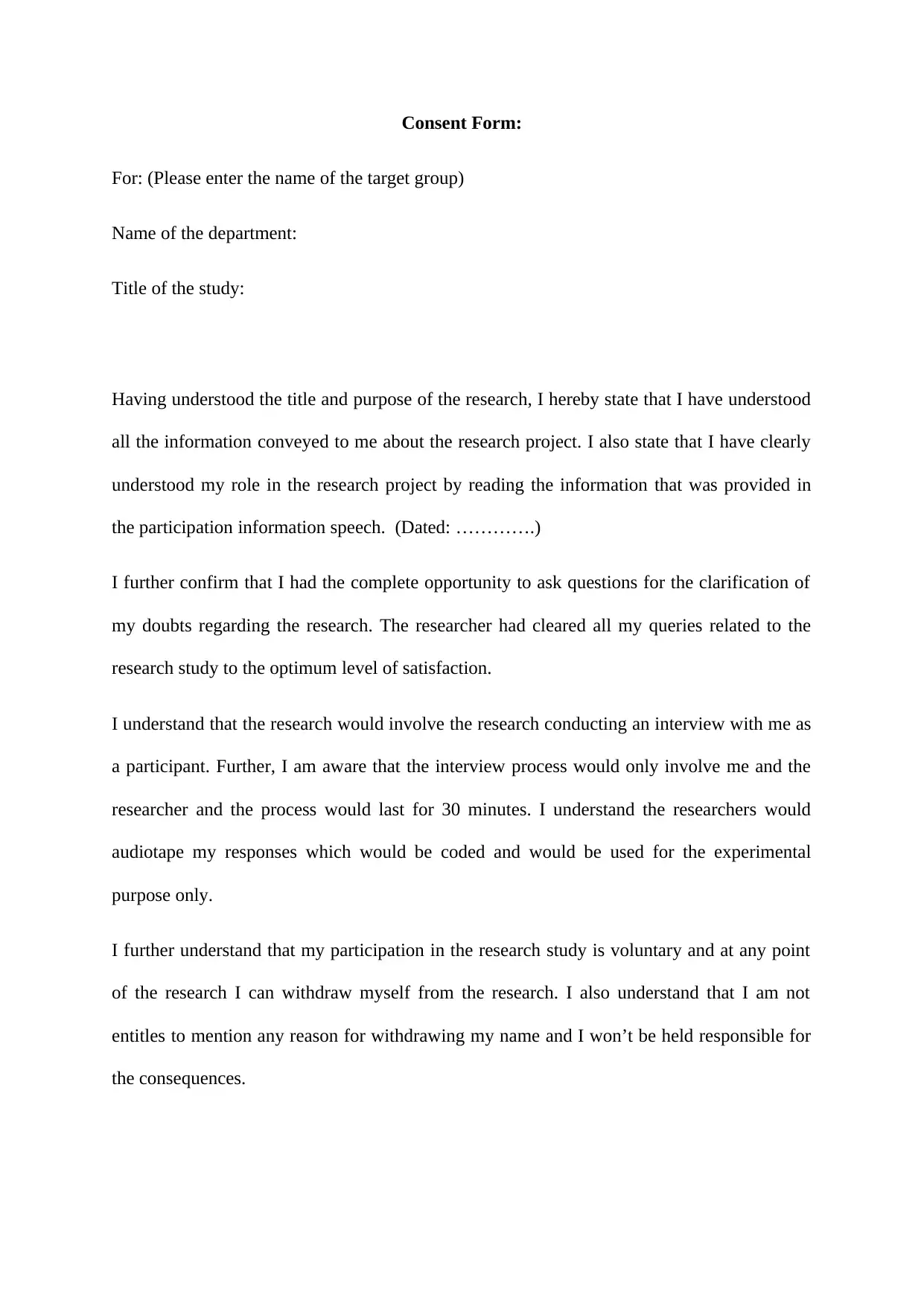
Consent Form:
For: (Please enter the name of the target group)
Name of the department:
Title of the study:
Having understood the title and purpose of the research, I hereby state that I have understood
all the information conveyed to me about the research project. I also state that I have clearly
understood my role in the research project by reading the information that was provided in
the participation information speech. (Dated: ………….)
I further confirm that I had the complete opportunity to ask questions for the clarification of
my doubts regarding the research. The researcher had cleared all my queries related to the
research study to the optimum level of satisfaction.
I understand that the research would involve the research conducting an interview with me as
a participant. Further, I am aware that the interview process would only involve me and the
researcher and the process would last for 30 minutes. I understand the researchers would
audiotape my responses which would be coded and would be used for the experimental
purpose only.
I further understand that my participation in the research study is voluntary and at any point
of the research I can withdraw myself from the research. I also understand that I am not
entitles to mention any reason for withdrawing my name and I won’t be held responsible for
the consequences.
For: (Please enter the name of the target group)
Name of the department:
Title of the study:
Having understood the title and purpose of the research, I hereby state that I have understood
all the information conveyed to me about the research project. I also state that I have clearly
understood my role in the research project by reading the information that was provided in
the participation information speech. (Dated: ………….)
I further confirm that I had the complete opportunity to ask questions for the clarification of
my doubts regarding the research. The researcher had cleared all my queries related to the
research study to the optimum level of satisfaction.
I understand that the research would involve the research conducting an interview with me as
a participant. Further, I am aware that the interview process would only involve me and the
researcher and the process would last for 30 minutes. I understand the researchers would
audiotape my responses which would be coded and would be used for the experimental
purpose only.
I further understand that my participation in the research study is voluntary and at any point
of the research I can withdraw myself from the research. I also understand that I am not
entitles to mention any reason for withdrawing my name and I won’t be held responsible for
the consequences.
Paraphrase This Document
Need a fresh take? Get an instant paraphrase of this document with our AI Paraphraser
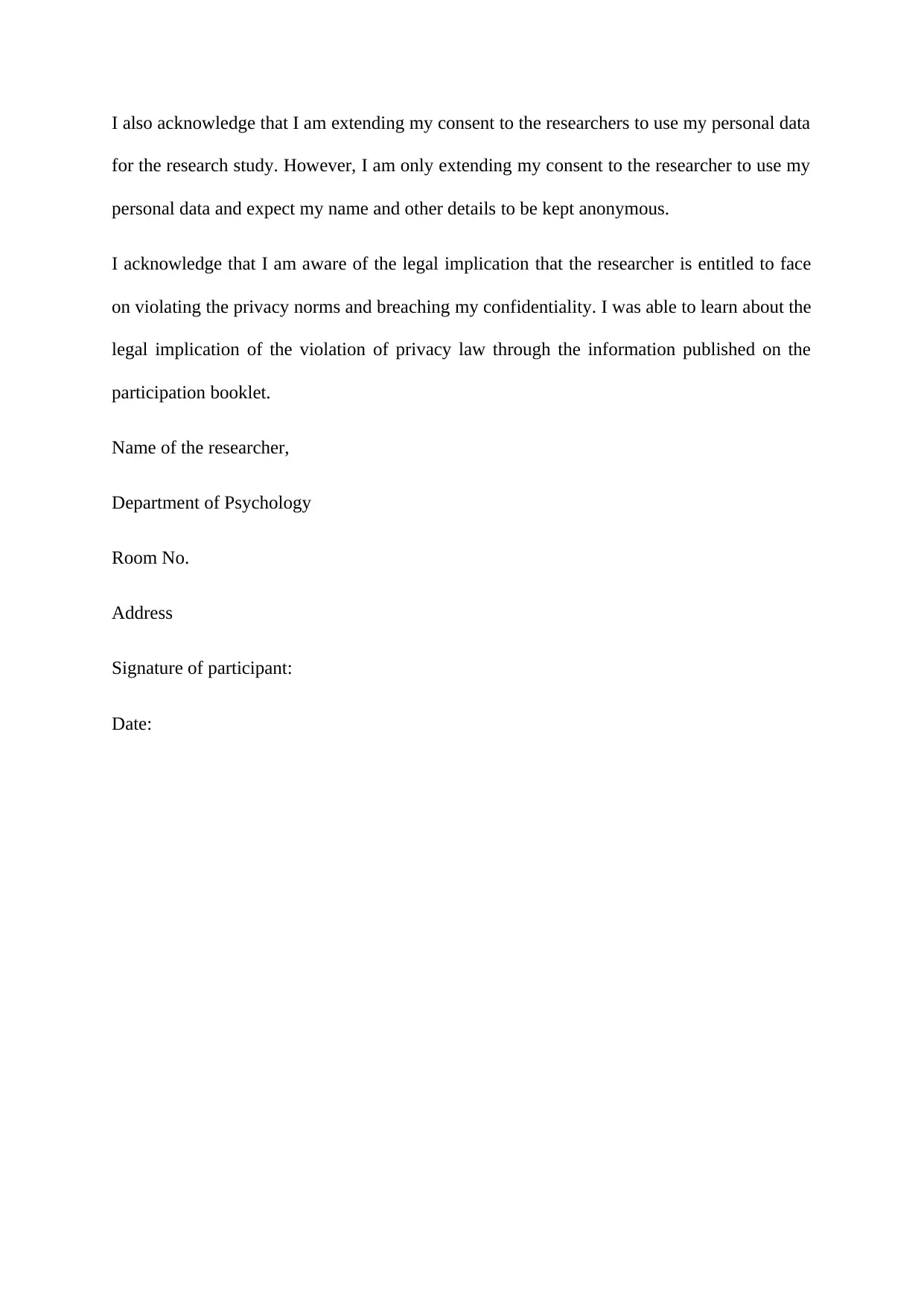
I also acknowledge that I am extending my consent to the researchers to use my personal data
for the research study. However, I am only extending my consent to the researcher to use my
personal data and expect my name and other details to be kept anonymous.
I acknowledge that I am aware of the legal implication that the researcher is entitled to face
on violating the privacy norms and breaching my confidentiality. I was able to learn about the
legal implication of the violation of privacy law through the information published on the
participation booklet.
Name of the researcher,
Department of Psychology
Room No.
Address
Signature of participant:
Date:
for the research study. However, I am only extending my consent to the researcher to use my
personal data and expect my name and other details to be kept anonymous.
I acknowledge that I am aware of the legal implication that the researcher is entitled to face
on violating the privacy norms and breaching my confidentiality. I was able to learn about the
legal implication of the violation of privacy law through the information published on the
participation booklet.
Name of the researcher,
Department of Psychology
Room No.
Address
Signature of participant:
Date:
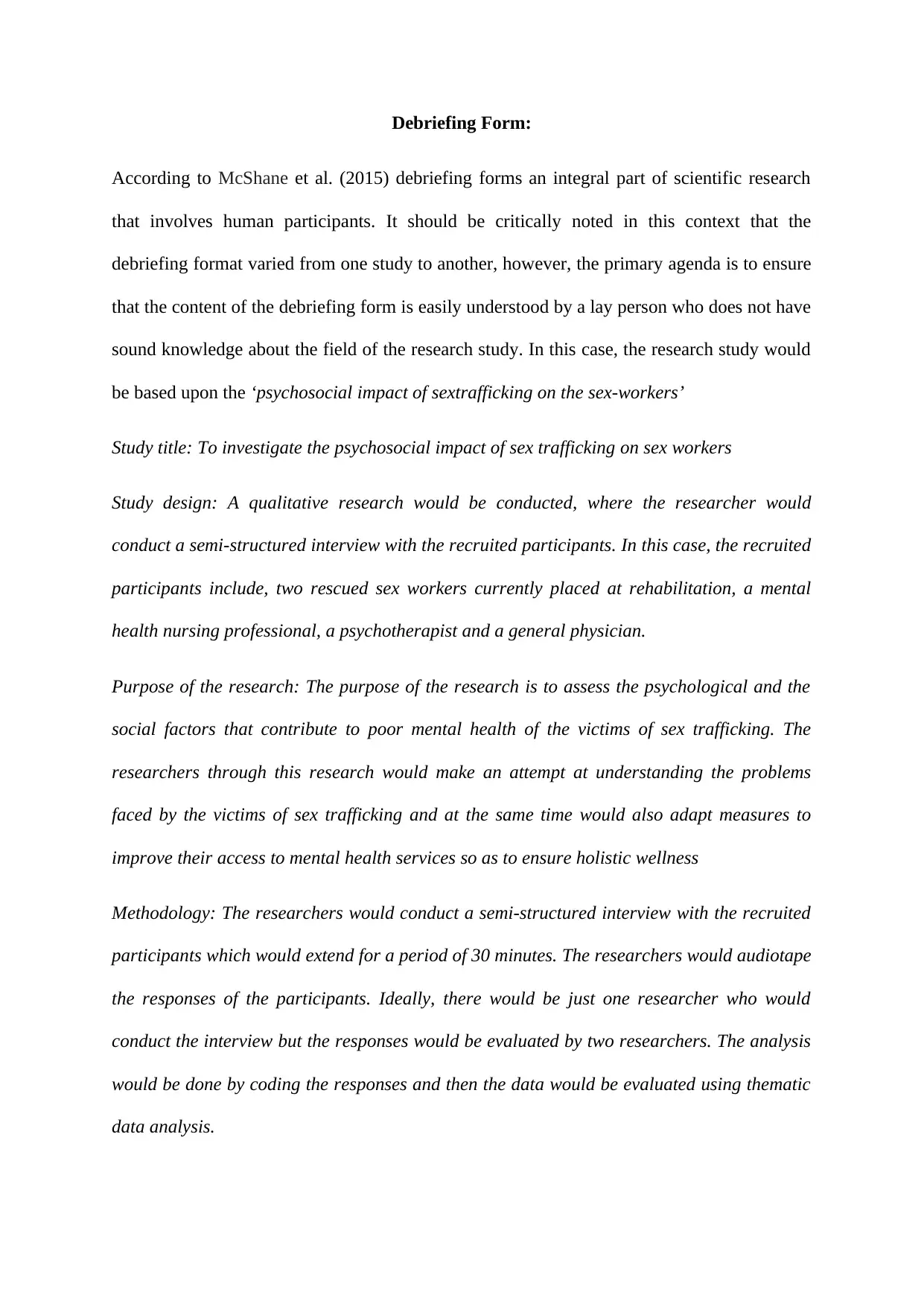
Debriefing Form:
According to McShane et al. (2015) debriefing forms an integral part of scientific research
that involves human participants. It should be critically noted in this context that the
debriefing format varied from one study to another, however, the primary agenda is to ensure
that the content of the debriefing form is easily understood by a lay person who does not have
sound knowledge about the field of the research study. In this case, the research study would
be based upon the ‘psychosocial impact of sextrafficking on the sex-workers’
Study title: To investigate the psychosocial impact of sex trafficking on sex workers
Study design: A qualitative research would be conducted, where the researcher would
conduct a semi-structured interview with the recruited participants. In this case, the recruited
participants include, two rescued sex workers currently placed at rehabilitation, a mental
health nursing professional, a psychotherapist and a general physician.
Purpose of the research: The purpose of the research is to assess the psychological and the
social factors that contribute to poor mental health of the victims of sex trafficking. The
researchers through this research would make an attempt at understanding the problems
faced by the victims of sex trafficking and at the same time would also adapt measures to
improve their access to mental health services so as to ensure holistic wellness
Methodology: The researchers would conduct a semi-structured interview with the recruited
participants which would extend for a period of 30 minutes. The researchers would audiotape
the responses of the participants. Ideally, there would be just one researcher who would
conduct the interview but the responses would be evaluated by two researchers. The analysis
would be done by coding the responses and then the data would be evaluated using thematic
data analysis.
According to McShane et al. (2015) debriefing forms an integral part of scientific research
that involves human participants. It should be critically noted in this context that the
debriefing format varied from one study to another, however, the primary agenda is to ensure
that the content of the debriefing form is easily understood by a lay person who does not have
sound knowledge about the field of the research study. In this case, the research study would
be based upon the ‘psychosocial impact of sextrafficking on the sex-workers’
Study title: To investigate the psychosocial impact of sex trafficking on sex workers
Study design: A qualitative research would be conducted, where the researcher would
conduct a semi-structured interview with the recruited participants. In this case, the recruited
participants include, two rescued sex workers currently placed at rehabilitation, a mental
health nursing professional, a psychotherapist and a general physician.
Purpose of the research: The purpose of the research is to assess the psychological and the
social factors that contribute to poor mental health of the victims of sex trafficking. The
researchers through this research would make an attempt at understanding the problems
faced by the victims of sex trafficking and at the same time would also adapt measures to
improve their access to mental health services so as to ensure holistic wellness
Methodology: The researchers would conduct a semi-structured interview with the recruited
participants which would extend for a period of 30 minutes. The researchers would audiotape
the responses of the participants. Ideally, there would be just one researcher who would
conduct the interview but the responses would be evaluated by two researchers. The analysis
would be done by coding the responses and then the data would be evaluated using thematic
data analysis.
⊘ This is a preview!⊘
Do you want full access?
Subscribe today to unlock all pages.

Trusted by 1+ million students worldwide
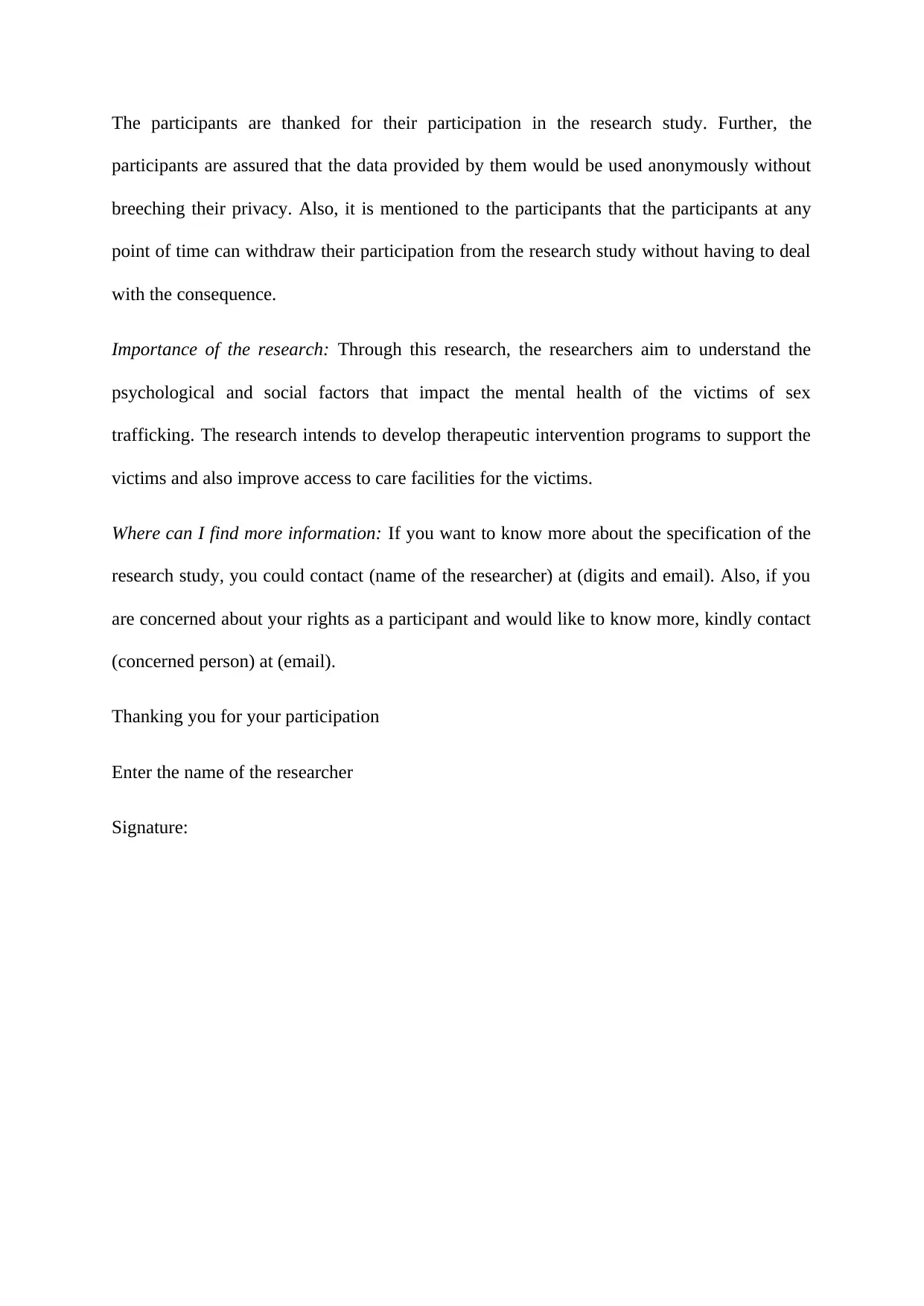
The participants are thanked for their participation in the research study. Further, the
participants are assured that the data provided by them would be used anonymously without
breeching their privacy. Also, it is mentioned to the participants that the participants at any
point of time can withdraw their participation from the research study without having to deal
with the consequence.
Importance of the research: Through this research, the researchers aim to understand the
psychological and social factors that impact the mental health of the victims of sex
trafficking. The research intends to develop therapeutic intervention programs to support the
victims and also improve access to care facilities for the victims.
Where can I find more information: If you want to know more about the specification of the
research study, you could contact (name of the researcher) at (digits and email). Also, if you
are concerned about your rights as a participant and would like to know more, kindly contact
(concerned person) at (email).
Thanking you for your participation
Enter the name of the researcher
Signature:
participants are assured that the data provided by them would be used anonymously without
breeching their privacy. Also, it is mentioned to the participants that the participants at any
point of time can withdraw their participation from the research study without having to deal
with the consequence.
Importance of the research: Through this research, the researchers aim to understand the
psychological and social factors that impact the mental health of the victims of sex
trafficking. The research intends to develop therapeutic intervention programs to support the
victims and also improve access to care facilities for the victims.
Where can I find more information: If you want to know more about the specification of the
research study, you could contact (name of the researcher) at (digits and email). Also, if you
are concerned about your rights as a participant and would like to know more, kindly contact
(concerned person) at (email).
Thanking you for your participation
Enter the name of the researcher
Signature:
Paraphrase This Document
Need a fresh take? Get an instant paraphrase of this document with our AI Paraphraser
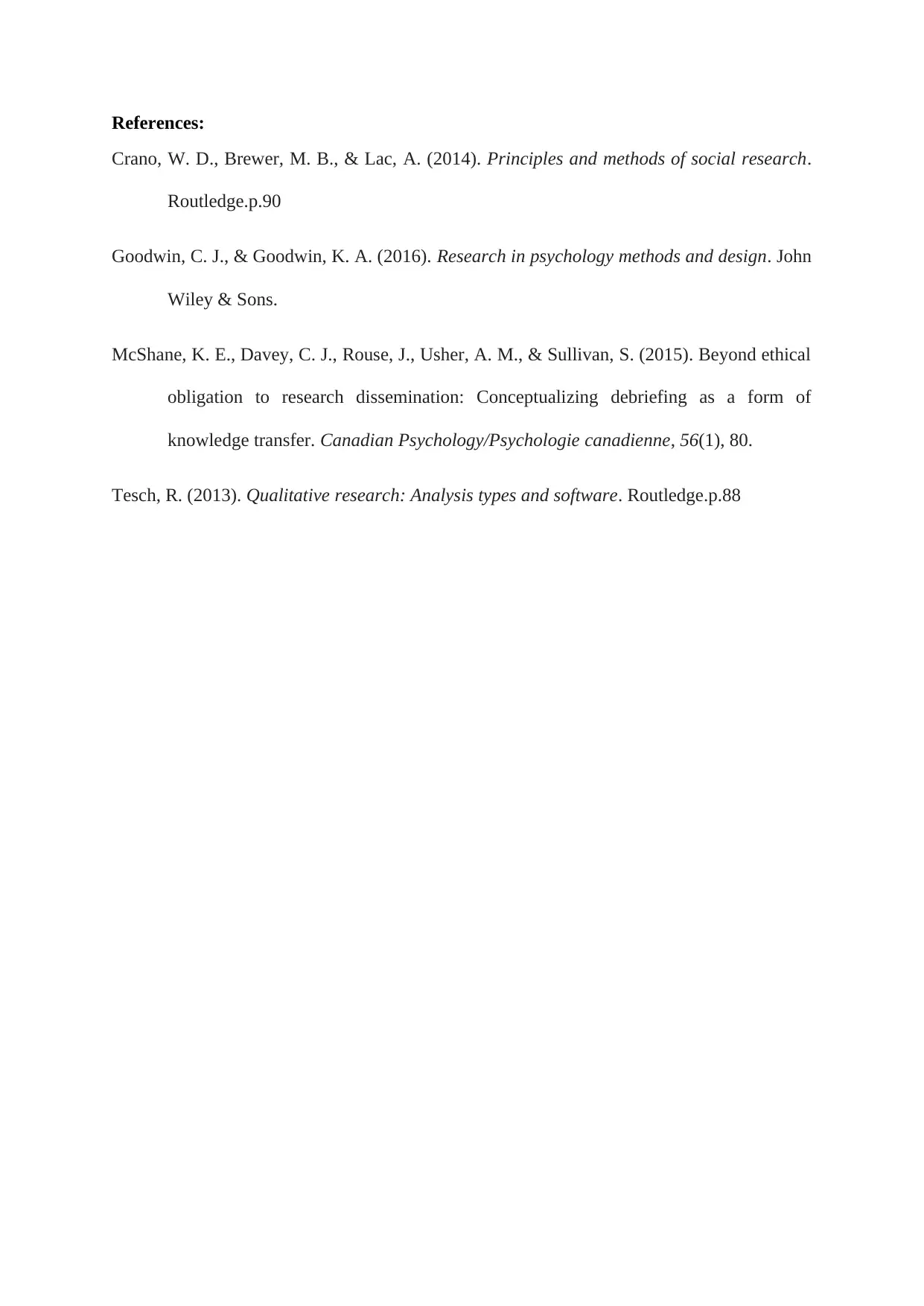
References:
Crano, W. D., Brewer, M. B., & Lac, A. (2014). Principles and methods of social research.
Routledge.p.90
Goodwin, C. J., & Goodwin, K. A. (2016). Research in psychology methods and design. John
Wiley & Sons.
McShane, K. E., Davey, C. J., Rouse, J., Usher, A. M., & Sullivan, S. (2015). Beyond ethical
obligation to research dissemination: Conceptualizing debriefing as a form of
knowledge transfer. Canadian Psychology/Psychologie canadienne, 56(1), 80.
Tesch, R. (2013). Qualitative research: Analysis types and software. Routledge.p.88
Crano, W. D., Brewer, M. B., & Lac, A. (2014). Principles and methods of social research.
Routledge.p.90
Goodwin, C. J., & Goodwin, K. A. (2016). Research in psychology methods and design. John
Wiley & Sons.
McShane, K. E., Davey, C. J., Rouse, J., Usher, A. M., & Sullivan, S. (2015). Beyond ethical
obligation to research dissemination: Conceptualizing debriefing as a form of
knowledge transfer. Canadian Psychology/Psychologie canadienne, 56(1), 80.
Tesch, R. (2013). Qualitative research: Analysis types and software. Routledge.p.88
1 out of 5
Related Documents
Your All-in-One AI-Powered Toolkit for Academic Success.
+13062052269
info@desklib.com
Available 24*7 on WhatsApp / Email
![[object Object]](/_next/static/media/star-bottom.7253800d.svg)
Unlock your academic potential
Copyright © 2020–2026 A2Z Services. All Rights Reserved. Developed and managed by ZUCOL.





